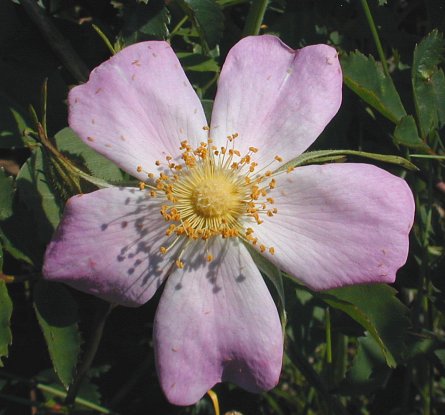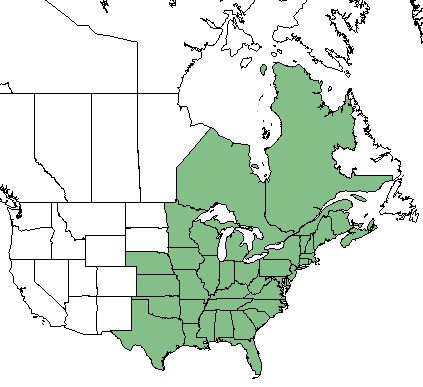Difference between revisions of "Rosa carolina"
(→Habitat) |
|||
| Line 34: | Line 34: | ||
==Ecology== | ==Ecology== | ||
===Habitat=== | ===Habitat=== | ||
| − | Habitats for ''R. carolina'' include upland forests, wooddlands, pastures, and roadsides. <ref name= "Weakley"> Weakley, A. S. (2015). Flora of the Southern and Mid-Atlantic States. Chapel Hill, NC, University of North Carolina Herbarium.</ref> Specimens have been collected from pine-oak woodland, partial shade of a trail, full sun of a cmaping ground, edge of abandoned limestone quarry, upland oak woodland, and planted slash pine region. <ref name = "FSU herbarium"> URL: http://herbarium.bio.fsu.edu. Last accessed: June 2018. Collectors: Loran C. Anderson, Gary Knight, John Nelson, R.K. Godfery, Richard Mitchell, Rodie White, R. Komarek, William Platt, Bob Farley, D.C.F. States and counties: Florida (Alachua, Leon, Jackson) Georgia (Grady, Thomas)</ref> | + | Habitats for ''R. carolina'' include upland forests, wooddlands, pastures, and roadsides.<ref name= "Weakley"> Weakley, A. S. (2015). Flora of the Southern and Mid-Atlantic States. Chapel Hill, NC, University of North Carolina Herbarium.</ref> Specimens have been collected from pine-oak woodland, partial shade of a trail, full sun of a cmaping ground, edge of abandoned limestone quarry, upland oak woodland, and planted slash pine region.<ref name = "FSU herbarium"> URL: http://herbarium.bio.fsu.edu. Last accessed: June 2018. Collectors: Loran C. Anderson, Gary Knight, John Nelson, R.K. Godfery, Richard Mitchell, Rodie White, R. Komarek, William Platt, Bob Farley, D.C.F. States and counties: Florida (Alachua, Leon, Jackson) Georgia (Grady, Thomas)</ref> |
| − | Coarse soils are ideal for ''R. carolina''. It has a high tolerance for drought and a medium tolerance for fire and shade. <ref name= "USDA"> [https://plants.usda.gov/core/profile?symbol=CEAM USDA Plant Database]</ref> | + | Coarse soils are ideal for ''R. carolina''. It has a high tolerance for drought and a medium tolerance for fire and shade.<ref name= "USDA"> [https://plants.usda.gov/core/profile?symbol=CEAM USDA Plant Database]</ref> |
<!--Natural communities, human disturbed habitats, topography, hydrology, soils, light, fire regime requirements for removal of competition, etc.--> | <!--Natural communities, human disturbed habitats, topography, hydrology, soils, light, fire regime requirements for removal of competition, etc.--> | ||
| + | |||
===Phenology=== | ===Phenology=== | ||
''R. carolina'' has been observed to flower in April, May, and August with peak inflorescence in May.<ref name= "Pan Flora"> Nelson, G. PanFlora: Plant data for the eastern United States with emphasis on the Southeastern Coastal Plains, Florida, and the Florida Panhandle. www.gilnelson.com/PanFlora/ Accessed: 29 MAY 2018</ref> | ''R. carolina'' has been observed to flower in April, May, and August with peak inflorescence in May.<ref name= "Pan Flora"> Nelson, G. PanFlora: Plant data for the eastern United States with emphasis on the Southeastern Coastal Plains, Florida, and the Florida Panhandle. www.gilnelson.com/PanFlora/ Accessed: 29 MAY 2018</ref> | ||
Revision as of 12:07, 22 April 2021
Common names: Carolina Rose[1], pasture rose[2]
| Rosa carolina | |
|---|---|

| |
| Photo by John Hilty hosted at IllinoisWildflowers.info | |
| Scientific classification | |
| Kingdom: | Plantae |
| Division: | Magnoliophyta - Flowering plants |
| Class: | Magnoliopsida - Dicots |
| Order: | Rosales |
| Family: | Rosaceae |
| Genus: | Rosa |
| Species: | R. carolina |
| Binomial name | |
| Rosa carolina L. | |

| |
| Natural range of Rosa carolina from USDA NRCS Plants Database. | |
Contents
Taxonomic Notes
Synonym: R. lyoni (Pursh), R. serrulata (Rafinesque); R. lyoni' Pursh; Rosa subserrulata (Rydberg)
Variety: R. carolina var. grandifolia (Baker) Rehder
Subspecies: Rosa carolina Linnaeus ssp. carolina; Rosa carolina Linnaeus ssp. subserrulata (Rydberg) W.H. Lewis
Description
R. carolina is a perennial subshrub of the Rosaceae family that is native to North America.[1]
Distribution
Rosa carolina is found throughout the entire eastern United States as far west as Texas, as well as, Ontario and Quebec.[1]
Ecology
Habitat
Habitats for R. carolina include upland forests, wooddlands, pastures, and roadsides.[3] Specimens have been collected from pine-oak woodland, partial shade of a trail, full sun of a cmaping ground, edge of abandoned limestone quarry, upland oak woodland, and planted slash pine region.[4]
Coarse soils are ideal for R. carolina. It has a high tolerance for drought and a medium tolerance for fire and shade.[1]
Phenology
R. carolina has been observed to flower in April, May, and August with peak inflorescence in May.[5]
Conservation and Management
Cultivation and restoration
Photo Gallery
References and notes
- ↑ 1.0 1.1 1.2 1.3 USDA Plant Database
- ↑ Goldblum, D., et al. (2013). "The impact of seed mix weight on diversity and species composition in a tallgrass prairie restoration planting, Nachusa grasslands, Illinois, USA." Ecological Restoration 31(2): 154-167.
- ↑ Weakley, A. S. (2015). Flora of the Southern and Mid-Atlantic States. Chapel Hill, NC, University of North Carolina Herbarium.
- ↑ URL: http://herbarium.bio.fsu.edu. Last accessed: June 2018. Collectors: Loran C. Anderson, Gary Knight, John Nelson, R.K. Godfery, Richard Mitchell, Rodie White, R. Komarek, William Platt, Bob Farley, D.C.F. States and counties: Florida (Alachua, Leon, Jackson) Georgia (Grady, Thomas)
- ↑ Nelson, G. PanFlora: Plant data for the eastern United States with emphasis on the Southeastern Coastal Plains, Florida, and the Florida Panhandle. www.gilnelson.com/PanFlora/ Accessed: 29 MAY 2018